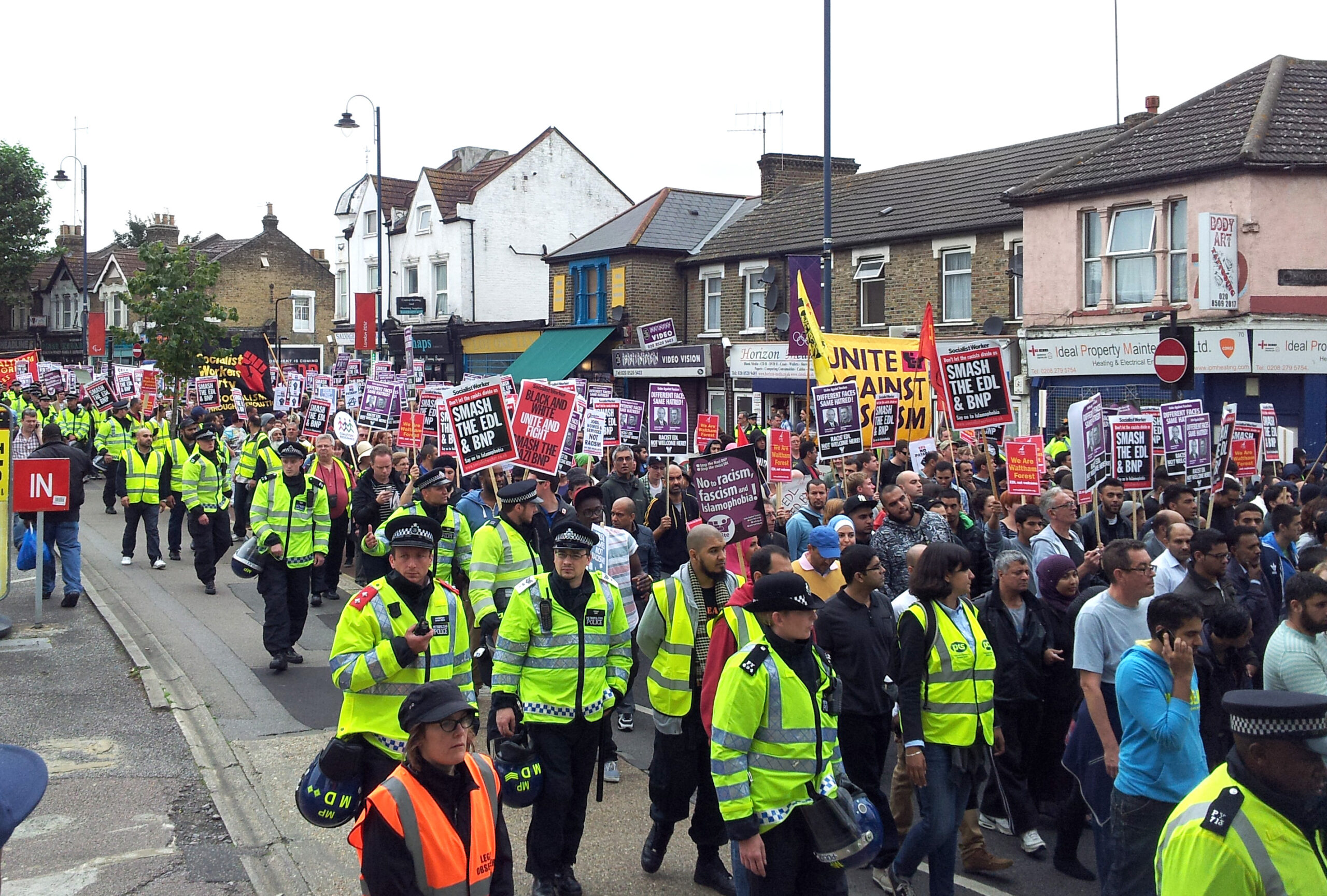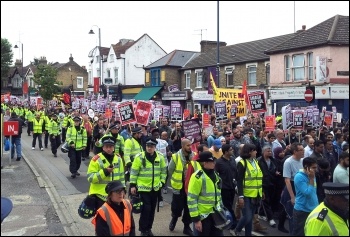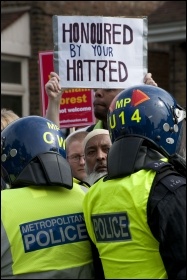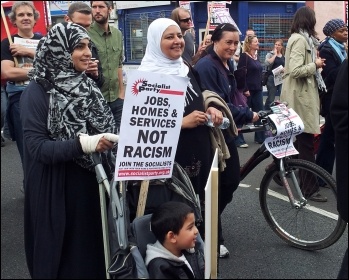Stopping the far-right – The need for democratic debate
Following the blocking of the racist, hooligan EDL in Walthamstow on Saturday 1st September by a great show of strength from anti-racist campaigners (See EDL rally stopped by anti-racists in Walthamstow), Paula Mitchell reports on the debates that took place in Waltham Forest prior to the counter-demonstration, and argues that honest, democratic discussion is needed in the anti-racist and labour movement on combatting the far right.
The anti-EDL demonstration in Walthamstow on 1st September was a victory against the EDL. The Socialist Party hopes it will humiliate and demoralise this violent racist organisation and make it much harder for them to mobilise in future.
But we would welcome a serious discussion with other anti-racist and labour movement forces about how to combat the threat of the far right over the coming period.
Socialist Party members in Waltham Forest worked hard for the ‘We are Waltham Forest’ (WAWF) demonstration in Walthamstow.
Along with Youth Fight for Jobs supporters, our members leafleted at colleges and workplaces, and visited youth clubs and other areas where young people go in the holidays.
We went door to door to discuss with local people. As well as building for the ‘We are Waltham Forest’ public rallies, Youth Fight for Jobs held a public meeting aimed specifically at young people, and also hosted informal discussions in a couple of neighbourhoods.
Once the EDL’s route was known, our members visited shops, temples, businesses and the fire station on the route.
When the EDL announced they would muster at Kings Cross, our members alerted London RMT to this fact.
We attended the weekly organising meetings of ‘We are Waltham Forest’, a grouping set up to organise the counter-protest, which was led by Unite Against Fascism and the Socialist Workers Party.
There were two issues in particular which Socialist Party members raised in these meetings, and which met with opposition from the main organisers, the UAF/SWP.
Role of trade unions
The first was the political basis of the campaign. We all agreed on the need to mobilise the biggest opposition possible to the EDL, and we were all prepared to link arms with anyone on the day to oppose them.
However, Socialist Party members argued that the most important force to mobilise is the working class, and in particular the organised working class in the trade unions.
Deepening austerity means that there is the potential for the EDL, or a force like it, to grow, unless the campaign against them is united with the campaign to stop the cuts.
Hundreds of thousands of workers have lost their jobs; millions more are hit by attacks on their pensions and the public sector pay freeze.
Benefits are being stripped away, while essential services are slashed. Yet 85% of the cuts are still to be implemented. We are told that the cuts will continue until at least 2020.
When fighting the EDL we need maximum unity. All sections of our communities have an important part to play.
But it is a massive, united campaign of working class people that has the power not only to marginalise and smash groupings like the EDL, but to hold out hope in a real future to those small layers of people who might be attracted by them.
The big events of last year (the 26 March TUC demo, 30 June and 30 November public sector strikes) and the 10 May strike this year, all show that the organised working class in the trade unions has the power to mobilise masses of people in decisive action.
The trade unions should be at the heart of any fight against the EDL, making it clear that they stand firmly in the interests of defending all sections of our communities against austerity attacks.
Yet under the SWP leadership of ‘We are Waltham Forest’ the trade unions only played a peripheral role.
It would take preparation, but the serious mobilisation of firefighters, bin workers and so on in the borough would have had an even greater impact on the ability of the EDL to march.
In fact the SWP insisted throughout that the campaign could not take up these class issues against cuts.
Labour Party support
The Socialist Workers Party argued that in order to achieve maximum unity against the EDL the campaign should not introduce issues that might alienate some people, and ‘not everyone is against the cuts’.
In particular this referred to Labour councillors who implement cuts and Labour MPs who do not oppose cuts.

Anti-EDL demonstrators, Walthamstow, 1.9.12, photo Mina Boromand
The argument went that many people have joined the Labour Party recently and still vote Labour, and so Labour’s involvement would draw more people into activity.
If the campaign against the EDL was also against cuts, Labour leaders would not get involved, so the campaign could not oppose cuts.
While of course we had no opposition to Labour Party members being involved in the campaign and mobilising on the day, we argued that it was a mistake to uncritically put up politicians such as New Labour MP Stella Creasy and local Labour councillors as speakers and leaders of this campaign.
The reality is that those working class people who vote Labour and the few who have joined Labour are seeking protection against the cuts.
It is the policies of the main political parties – the Tory-Lib Dem government and the Labour councillors who pass on their cuts in our borough – that create the despair and division in which the EDL thrives.
It is Labour’s betrayal of the hopes of masses of working class people that led to nearly 70% of the electorate not voting for anyone in the 2012 council elections.
Labour politicians’ uncriticised involvement could put off many workers whose jobs and livelihoods have been torn away.
In fact, the Labour council encouraged people not to take part in the counter-demonstration. They even failed to put up any real opposition to the EDL planning its rally in front of the Town Hall, claiming they had no powers to stop them – despite having previously tried to stop anti-cuts campaigners holding stalls in the town square!
Stopping the EDL
The second main issue which came to the fore at the end of the campaign was the lack of discussion about what the 1st September mobilisation was intended to do.
In our opinion, mixed messages were sent out by the campaign from the start. The final leaflet correctly said “Stop the EDL”.
To stop the EDL is a serious matter, yet 1st September was also billed as a “celebration of our multi-cultural community”.
Of course it was not known what the EDL’s plans were, or what the police were going to allow, right up until the last minute.
And even then, maximum flexibility would be needed on the day to respond as events developed. Nonetheless, a democratic campaign would at least discuss amongst the main organisers what our intentions were on the day in order to be prepared.
This was refused on the grounds that it was pointless to speculate. When we tried to warn that the police may not just facilitate our demo but could kettle or pen us, the WAWF leaders stated that the police would not be able to kettle us.
We also argued that, given that decisions would have to be made on the day, the organising group should be involved in those decisions.
We were told that this was elitist! The contradictory responses ranged from “the demonstration will decide” to “the chief stewards will decide”. In practice this meant that decisions were made behind closed doors by the SWP.
Unacceptable behaviour
We know that others involved in the campaign shared similar views. However, rather than have a proper discussion on the issues, a mood was generated in the meetings by SWP/UAF members which encouraged a bating, infantile approach to Socialist Party members, and which made it difficult for others who agreed with us on some points to speak up.
Especially towards the end of the campaign, no matter what our members said in the meetings, even when we made points which were made by other people subsequently, we were met with heckles, sneers and derision.
Older male SWP members shouted at young women SP members. We were sworn at. We have even faced outrageous accusations that we are “Islamaphobes”, have no experience of organising against the EDL, and of “running away” at previous anti-EDL protests.
The irony is that when flexibility was required on the day – once the occupation of Forest Road, which successfully blocked the EDL from their desired route, was being circumvented by the police – SWP members berated the Socialist Party and YFJ activists who responded to this change of events and worked with Daymer activists to help redirect protesters to the Town Hall.
At this point the EDL had set up their stage outside the Town Hall and were intimidating residents and others.
Over 200 angry local black and Asian youth had gathered and were being held back by the police. The action of helping the demo to break out of its pen meant that protesters avoided this second police line and were able to directly confront the EDL.
Accusations and disinformation
We are aware that a different narrative will be told of this campaign by the SWP and UAF. It is unfortunate that we need to go into this much detail, but it is necessary because of the disinformation being circulated by the SWP.
We are accused of being wreckers and splitters. We do not accept that raising a different viewpoint from that of the “leaders” constitutes wrecking.
We are accused of trying to split the campaign, because the Socialist Party and Youth Fight for Jobs produced leaflets and held public meetings.
Yet it should be a standard of any united front campaign that the different participants, while working together in a common cause, have the freedom to elaborate their own views in their own material and meetings.
We are accused of telling people NOT to come on the demo. In fact we spent months vigorously campaigning for this demonstration. Our call was carried in the local Waltham Forest Guardian:
“The Waltham Forest Socialist Party is also encouraging supporters to take part in the anti-racism demonstration….
“Walthamstow Socialist Party branch secretary Bob Severn said: “The rise of Golden Dawn in Greece shows how racist organisations can grow at a time of austerity.
“The fight against racism is therefore linked to uniting working-class people against the cuts and for jobs, homes and services.”
One accusation thrown at our members on the day that we do accept was that we encouraged people not to bring children. That this was shouted at our members while protesters were facing lines of riot police simply demonstrates the correctness of our view!
The far-right threat
1st September in Walthamstow was a success. Despite the efforts of a massive police operation to get them to their destination, the EDL were unable to hold their rally and were sent packing by a large demonstration.
But the growth of the far-right in some European countries is a clear warning as to what could develop in Britain.
In Greece the lives of millions of working and middle-class people have been shattered and the social consequences have been devastating.
Public sector workers have seen wages slashed by 40%. Many workers are paid starvation wages of €400 per month.
The number of hospital beds is being slashed by 50%. Thousands of schools have been closed down. Many thousands have become homeless. Unemployment is over 21%, – 51% amongst youth.
In these conditions the neo-fascist Golden Dawn has achieved 7% of the vote in the general elections in May and June.
This is despite their violent terror tactics: attacking left-wing MPs on television and attacking left-wing campaign stalls; hospitalising and murdering immigrants in pogroms while the police stand by.
In France, for the first time in 24 years, the far-right Front National won two seats in June’s elections to the national assembly, with 13.6% of the vote.
In Hungary the right wing government allows the “Garda” bands of neo-fascist Jobbik to rampage the streets terrorising people and driving Jews out of villages.
Of course, in Britain the development of the far-right has not reached such proportions. The British National Party (BNP) made some electoral inroads up to 2010 but since then have lost those positions, having been riven with internal strife and successfully opposed in local communities.
But we think there is a need for an honest and democratic debate in the trade unions and anti-racist movement about the ideas and methods necessary, not just to defeat them one protest at a time, but to defeat them long term.
This version of this article was first posted on the Socialist Party website on 4 September 2012 and may vary slightly from the version subsequently printed in The Socialist.












